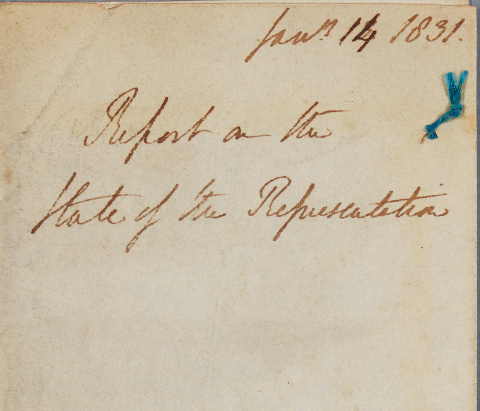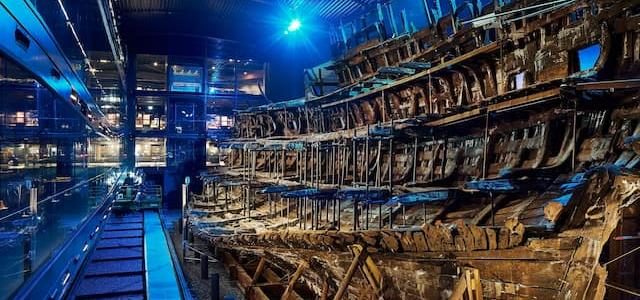
Durham University gives new home to fascinating archives of ‘Radical Jack’
Durham University, has purchased the remarkable archives of John George Lambton, the first Earl of Durham and a key figure in 19th century politics, opening up the collection for study for the first time in over 40 years.

Lord Durham, known as ‘Radical Jack’ for his strong support for political reform, was central to parliamentary reform, including the Great Reform Act of 1832.
Lord Durham held international diplomatic roles including two terms as Ambassador to Russia and a brief, controversial period as Governor-in-Chief of Canada. He also had a close friendship with Leopold I, King of the Belgians.
The collection features thousands of letters, dispatches and other papers, providing a fascinating behind-the-scenes insight into one of the defining periods in British political history. The purchase also brings together the papers of Lord Durham and Earl Grey in one location, creating a leading resource for research in this area.
Durham University has bought the collection, for £684,000, with the help of a £302,000 grant from the National Heritage Memorial Fund, in recognition of the historical significance of the collection.
The purchase, which was overseen by the Books & Manuscripts department at Sotheby’s auction house in London, was also made possible by grants from the Friends of the National Libraries and the Friends of Palace Green Library.
Speaking about the purchase, Liz Waller, University Librarian at Durham University, said: “Lord Durham was a prominent figure in political reform in the nineteenth century and we are proud to be the new home for his fascinating collection of papers, keeping them here in the North East.
“For Arts and Humanities scholars a collection of this significance is the equivalent of new state-of-the-art equipment for scientists, and this purchase demonstrates the University’s commitment to research excellence in all fields.”
Discussing the research value of the collection, Dr Richard Huzzey, Associate Professor, Department of History at Durham University, said: “Lord Lambton was a real firebrand in his time and through his archive we get to peak behind the curtain into a period of dramatic political reform.
“The range of correspondence is the equivalent of getting a look at the emails of politicians – it is a real ring-side seat! Lord Lambton’s letters cover a who’s who of nineteenth century society but also reveal his local influence as an employer and landed aristocrat.”
Speaking about the sale of his ancestor’s collection to Durham University, Edward Lambton, 7th Earl of Durham, said: “I am delighted that the archive will remain in the First Earl’s native North East of England, just a few miles away from his home at Lambton Castle.
“The papers hold a wealth of rich material about the region and, in their wonderful new home at the University, they will not only be preserved for future generations, but also be properly studied and see their secrets unlocked for the very first time.”
Highlights of the collection include:
- Original documentation relating to the ‘Committee of Four’ (of which Lord Durham was one), entrusted by Lord Grey, as Prime Minister, with the preparation of the first draft of the Reform Bill, designed to make the British electoral system fairer.
- A complete set of letters between Lord Durham and Joseph Parkes, a key figure in reformist circles.
- Letters from prominent nineteenth century political figures including Lord Melbourne and Lord Palmerston, as well as other key figures of the period including Leopold I, King of the Belgians and Sir John Conroy, the controversial and influential adviser to Queen Victoria’s mother, the Duchess of Kent.
- Over 370 letters from Lord Durham’s private secretary, which detail work on the Reform Bill as well as Lord Durham’s diplomatic missions to Russia and Canada.
- Letters and notebooks belonging to Lord Durham’s second wife, Louisa Countess of Durham, a Lady of the Bedchamber to Queen Victoria. This includes letters from Her Majesty to Lady Durham around the time of Lady Durham’s resignation from her post.
- Correspondence relating to local politics within County Durham including the construction of the Stockton-Darlington railway (pivotal to the Industrial Revolution) and the establishment of the University of Durham (now Durham University).
- Insight into the Lambton family’s support for literature, art and science including correspondence with inventor Humphrey Davy about the mining safety lamp; papers about researcher William Snow Harris and the lightning conductor he invented; and correspondence revealing a good relationship with leading female sociologist, Harriet Martineau.
- A series of letters by artist B.R. Haydon including discussion and preliminary sketches of his painting of the Reform Banquet and letters about a portrait of Lord Durham to commemorate the Reform.
The collection also provides insights into Lord Durham’s personality including his well-documented temper and his grief following multiple bereavements including the loss of his first wife and three of his children.
The purchase of the collection was made possible with the support of the National Heritage Memorial Fund, Friends of the National Libraries and Friends of Palace Green Library.
Sir Peter Luff, Chair of the NHMF, said: “A highly significant figure on both national and international levels, Lord Durham’s extensive archives in their entirety are certain to shed light on some of the key moments of our history. At the National Heritage Memorial Fund we felt it was essential these pieces of such importance to our political heritage were made accessible to the public for the first time.”
Heritage Minister Rebecca Pow said: "This is a fitting acquisition and Durham University will be an ideal home for this archive that offers an important insight into politics and life in the 1800s.
“I am pleased that thanks to the National Heritage Memorial Fund, this unique record of the past can be preserved for students of the future."
Dr. Gabriel Heaton, Sotheby’s Specialist in Books & Manuscripts, said: “We regularly oversee private sales at Sotheby’s, but rarely have the opportunity to share news of them. Over several months we were given the opportunity by the Earl of Durham to work on his fascinating archive, and were thrilled by what we found.
“Radical Jack was one of the great public figures of nineteenth-century Britain, however his papers are yet to be fully explored. We are very pleased to have been able to facilitate their transfer to the University, where their potential will now be realised.”
Once assessed and catalogued, the collection will be available to both scholars and the public for study, free of charge.
The University also plans to establish a series of projects and events to open up the archive to both the public and local schools.
This latest collection joins the treasure-trove of special collections held by Durham University, adding to their world-class resources for researchers and the public alike. These include the seventeenth century Bishop Cosin’s Library and the Sudan archive, both designated as outstanding collections of national and international importance.

